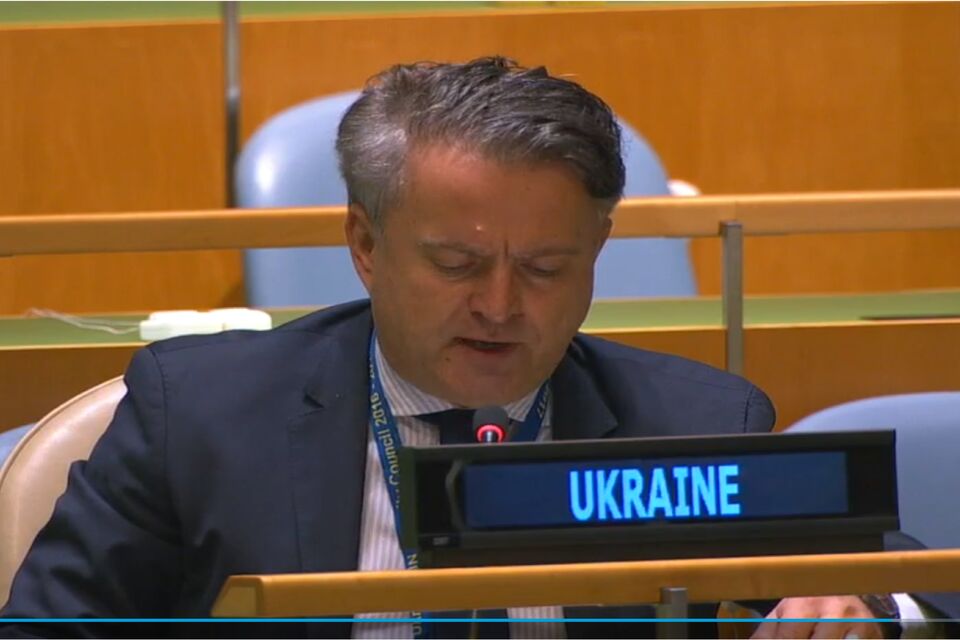Statement by Permanent Representative of Ukraine Sergiy Kyslytsya on the resolution "Problem of the militarization of the Autonomous Republic of Crimea and the city of Sevastopol, Ukraine"

Mr. President,
I have the honour to introduce the draft Resolution as contained in the document A/75/L.38 (Revision 1).
This year text focuses on the progressing militarization by the Russian Federation of the occupied territories of Ukraine: the Autonomous Republic of Crimea and the city of Sevastopol, as well as the parts of the Black Sea and the Sea of Azov.
The draft resolution addresses a matter of fundamental concern not only for my country, but for the United Nations membership at large.
It is about emerging challenges resulting from progressing militarization of Crimea, which undermines security and stability in the region and beyond.
By occupying the Peninsula and transforming it into a powerful military outpost in the region, the Russian Federation has violated fundamental norms and principles of international law, and, first of all, the UN Charter.
Nowadays, Crimea remains inaccessible for any verification or inspection under the relevant international treaties.
Since February 2014, the Russian Federation has significantly expanded its military presence in Crimea - with land, air and naval components. It endangers security of the countries far beyond the Black Sea region.
Let`s take a look at the current security landscape in Crimea:
- an ongoing inflow of weapons and means capable of delivering nuclear weapons;
- seizure of the former nuclear weapons storage sites;
- attempts by Russia to take de jure control over the nuclear facilities and materials;
- construction of new warships;
- conducting military exercises;
- conscription of among the local population to the Russian Armed Forces;
- “militarization” of education;
- hindering the exercise of navigational and commercial rights and freedoms.
Mr. President, distinguished colleagues,
Just two days ago we marked the 26th anniversary of signing by three nuclear states, including Russia, the Budapest Memorandum.
It aimed at providing security assurances in connection with Ukraine’s accession to the NPT.
Let me recall that the first obligation of three nuclear states under the Budapest Memorandum is “to respect the independence and sovereignty and the existing borders of Ukraine”.
The next paragraph obliged the three mentioned states, and I quote, “to refrain from the threat or use of force against the territorial integrity or political independence of Ukraine, and that none of their weapons will ever be used against Ukraine” (end of quote).
Two decades later, my country had to confront aggression unleashed by the nuclear weapon state, which signed up to the assurances of sovereignty and territorial integrity of Ukraine.
There is no doubt when the Russian delegation speaks today, we`ll hear the same narrative that Russia did not breach the Budapest Memorandum and the issue of Crimea is closed.
Yet, the issue of such flagrant violation of international law it cannot be closed, as it has no statute of limitations.
That is a traditional manipulation of facts by the Russian Federation.
While the facts are:
- Russia has brutally violated the Budapest Memorandum.
- Crimea is the integral part of Ukraine, temporarily occupied by the aggressor state that subsequently tried to illegally annex it.
UNGA has already reconfirmed these facts in its several decisions.
Mr. President, dear colleagues,
The occupation and subsequent militarization of Crimea have led to the expansion of the area where the Russian warships and military aircraft may be used.
Beyond Ukraine`s borders and the Black Sea region.
The aggressor state has renewed its power projection ability that nowadays may reach: the Southern Europe, the Middle East and the North Africa.
Shall I remind that the Russian Black Sea Fleet has been actively involved in the combat operations in Syria acting from its naval base in Crimea!
Being alarmed by the recent developments on the ground, Ukraine together with co-sponsors submitted the updated UNGA draft resolution on «Problem of the militarization of the Autonomous Republic of Crimea and the city of Sevastopol, Ukraine, as well as parts of the Black Sea and the Sea of Azov».
This year’s draft resolution contains a number of important elements, including those focusing on:
• illegal seizure and establishment of control over the former nuclear weapons storage sites in Crimea;
• destabilizing impact on the international verification and arms control regimes;
• the ongoing weapons supply, progressing «militarization» of education and illegal conscription to the Russian Armed Forces;
• negative implications for maritime trade.
The resolution seeks to ensure that Russia withdraws its military forces from Crimea stops the temporary occupation of Ukraine’s territory, as well as halts harassment of commercial vessels and lift restrictions to international shipping in the Black Sea and the Sea of Azov.
In other words, the resolution seeks to restore respect for legal norms, to ensure fulfillment of commitments and obligations, and to prevent further violations.
For our common security and welfare.
